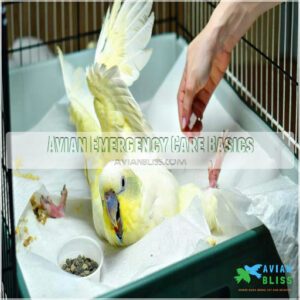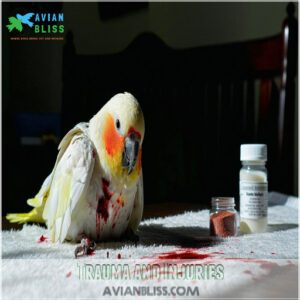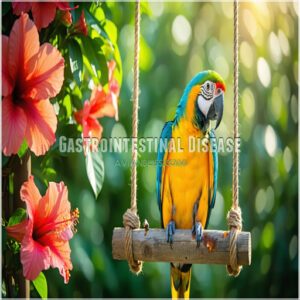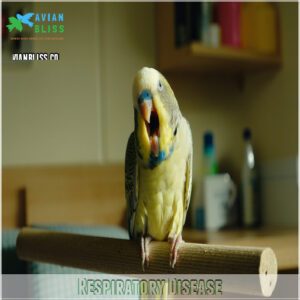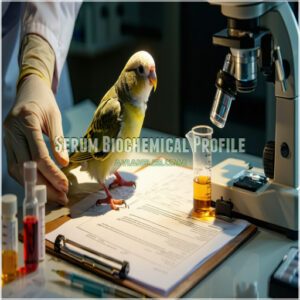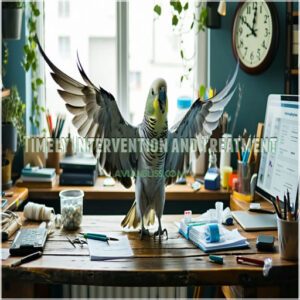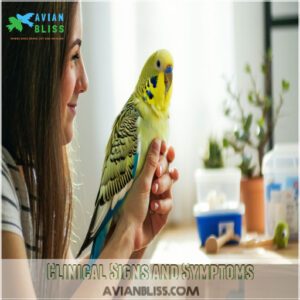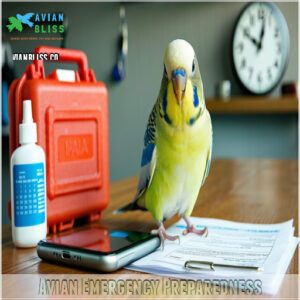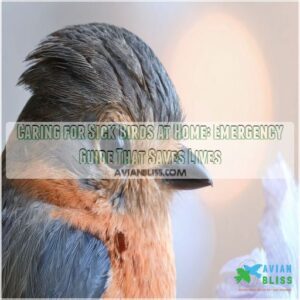This site is supported by our readers. We may earn a commission, at no cost to you, if you purchase through links.
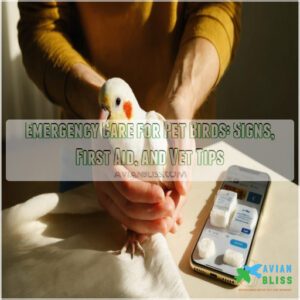
Watch for signs like labored breathing, quiet behavior, or unusual droppings—your bird’s subtle way of saying, “I need help.”
Gently handle your feathered friend, keeping them warm and calm.
If there’s bleeding, apply pressure with clean gauze.
Always call an avian vet before heading over because not every clinic is equipped for birds.
Keep a first aid kit handy with essentials like styptic powder and antiseptic wipes.
Preparation can save precious moments—because when birds whisper their distress, your readiness speaks volumes.
Curious about prevention tips?
Table Of Contents
- Key Takeaways
- Avian Emergency Care Basics
- Finding Avian Veterinarians
- Common Avian Health Issues
- Emergency Care for Sick Birds
- Bird Owner Responsibilities
- Avian Emergency Preparedness
- Frequently Asked Questions (FAQs)
- Where can I find bird vet services?
- How should I care for my new avian bird?
- Why should I see a veterinarian for my bird?
- How do I care for an avian patient?
- Do birds need critical care?
- What if my Pet needs an emergency after-hours visit?
- What vaccinations are recommended for pet birds?
- How to safely transport a bird in emergencies?
- Can stress affect a bird’s recovery process?
- What household items are toxic to birds?
- Conclusion
Key Takeaways
- Watch for subtle signs like labored breathing, changes in droppings, or unusual behavior, and act quickly to get your bird help.
- Keep a bird-specific first aid kit on hand with items like styptic powder, antiseptic wipes, and gauze for emergencies.
- Call an avian vet before visiting to ensure they’re equipped for birds, and keep emergency numbers and medical records easily accessible.
- Transport birds safely by using a ventilated travel cage with soft lining, keeping them warm while staying calm and quiet.
Avian Emergency Care Basics
When your bird faces an emergency, acting quickly can make all the difference.
Understanding the basics of avian care helps you recognize urgent signs, provide first aid, and get them the help they need.
Recognizing Alarming Signs
Your bird’s secretive nature means they’ll hide signs of illness until they’re seriously sick.
Watch for subtle health indicators like reduced chirping, unusual quietness, or changes in eating habits.
Emergency symptoms include respiratory distress, coughing, or sneezing.
Bird behavior changes, such as sitting still for long periods, can signal distress.
Keep an eye on droppings too – abnormal color or consistency needs immediate attention.
It’s essential to monitor your pet bird for general health signs to guarantee early detection of potential health issues and ensure early detection of problems, which is crucial for their well-being.
Providing Basic First Aid
Now that you know the warning signs, let’s focus on basic first aid skills.
A well-stocked bird first aid kit should include gauze, antiseptic wipes, and styptic powder for wound care.
When handling an injured pet bird, stay calm and gentle.
For bleeding, apply direct pressure using clean gauze.
Keep your feathered friend warm and quiet while seeking emergency bird care from an avian vet.
You will receive a reward if the task is completed correctly, with the key information being to stay calm.
Stabilization and Transfer
Once you’ve provided initial first aid, proper stabilization and transfer can mean life or death for your feathered friend.
Keep your bird warm during transport using a small carrier lined with soft towels. Head straight to an avian emergency care specialist, maintaining a quiet, dark environment to reduce stress.
If you’re more than 30 minutes away, call ahead – they’ll guide you through critical care protocols. It’s essential to find a vet with expertise in avian vet emergency services to assure the best possible care for your bird.
Finding Avian Veterinarians
You’ll need a qualified avian veterinarian for your feathered friend since most general veterinarians aren’t trained in bird care.
Finding the right bird doctor doesn’t have to be complicated, as you can start by checking local veterinary clinics and animal rescue organizations that specialize in exotic pets.
Local Veterinary Clinics
When your feathered friend needs help, finding specialized avian vet services is like searching for a rare gem.
You’ll want to locate veterinary clinics that offer specific emergency vet care for birds. Check their vet credentials and staff training in avian medicine.
Look for animal hospitals with proper clinic equipment and extended emergency hours. Call ahead to verify their clinic services include avian emergency care.
Animal Rescue Organizations
Your local wildlife refuges and animal shelters often maintain connections with avian specialists for emergency care.
When you’re facing a bird emergency, these rescue organizations can be invaluable resources, connecting you with experienced professionals who understand exotic pet care.
- Many animal shelters partner with volunteer networks specializing in bird rescue and rehabilitation
- Conservation efforts often include emergency response teams for both wild and domestic birds
- Some rescue organizations offer 24/7 guidance and can direct you to certified avian specialists
Local bird conservation groups play a vital role in supporting bird conservation organizations that provide essential care and resources for birds in need, which is a key part of bird conservation efforts.
Emergency Hotlines
While animal rescue groups offer valuable support, you’ll also want emergency numbers ready for those midnight health scares.
Keep a list of 24/7 hotline services and avian emergency services in your phone – they’re lifesavers when your bird needs urgent care at 2 AM.
Many phone support lines offer crisis management guidance until you can reach a vet, helping you stay calm and focused, providing urgent care when needed.
Common Avian Health Issues
You’ll need to watch for common health problems in your pet bird, including trauma, breathing troubles, and digestive issues that can quickly become serious.
If you notice changes in your bird’s behavior or physical condition, don’t wait to seek help since birds often hide their symptoms until they’re critically ill.
Trauma and Injuries
Rushing through your home, your beloved bird can suffer traumatic injuries requiring immediate attention.
Blood loss from broken blood feathers demands quick response with styptic powder, while fracture care requires careful immobilization before transport.
For concussion treatment, keep your pet calm in a dark, quiet space.
Wound healing may need emergency surgery, so it’s essential to know your avian vet’s location for bird trauma response. Effective use of styptic powder products can substantially aid in stopping blood loss from injuries.
Gastrointestinal Disease
Gastrointestinal disease in birds can sneak up on you, but spotting symptoms early is vital. Look out for regurgitation issues, diarrhea treatment needs, or anorexia causes.
Keep your bird’s gut health in check with these tips:
- Monitor droppings for clues about digestive problems.
- Address appetite loss promptly.
- Seek help for serious avian health emergencies like ongoing regurgitation.
Regular check-ups can help identify digestive disorders early on, which is crucial for maintaining your bird’s overall health and preventing serious conditions from developing, and ensuring proper care.
Respiratory Disease
Struggling to breathe, wheezing, or nasal discharge can signal respiratory disease in birds.
Watch for signs like tail bobbing or difficulty vocalizing—these suggest avian health emergencies needing prompt care.
Common issues include Air Sac Disease, Beak Disorders, Lung Infections, or Tracheal Issues.
Emergency care for pet birds means acting quickly—contacting a vet is necessary to provide proper help.
Hyperthermia and Hypothermia
When temperatures swing too high or too low, birds can experience hyperthermia (heat stroke) or hypothermia (cold stress), threatening their thermal regulation.
Watch for panting or shivering as signs.
Act fast to stabilize their body temperature:
- Protect your bird: Use proper climate control.
- Contact bird emergency services: It’s an avian emergency.
- Provide emergency care: Warm or cool gently.
Serum Biochemical Profile
After managing temperature extremes, let’s talk diagnostic tools.
A serum biochemical profile is like a snapshot of your bird’s inner workings.
This blood test analyzes organ enzymes, offering clues about liver, kidney, and general health.
It’s an essential bird health tip during medical emergencies.
Regular biochemical analysis keeps your pet bird healthy, ensuring they stay chirpy and hassle-free.
Emergency Care for Sick Birds
Acting quickly when your bird shows signs of illness can make all the difference in its recovery.
Recognizing symptoms like labored breathing or unusual behavior is essential so you can seek timely, species-specific care.
Timely Intervention and Treatment
In pet bird emergencies, time isn’t your friend.
Rapid response saves lives, so act fast when handling bird medical emergencies.
Follow emergency protocols for avian first response: secure safe transport, provide pet bird first aid, and get urgent treatment from bird emergency services.
Critical care and medical stabilization during bird emergencies can mean the difference between recovery and heartbreak, emphasizing the need for rapid response.
Clinical Signs and Symptoms
Keep an eye on emergency indicators like difficulty breathing (respiratory issues), seizures (neurological signs), or sudden behavioral changes.
Physical symptoms like unexplained swelling or bleeding often signal bird medical emergencies.
Birds hide illness well, so these clinical signs demand swift emergency care. Quick action protects avian health and prevents worsening symptoms—don’t wait if your bird seems off, as this can lead to serious respiratory issues or require emergency care.
Species-Specific Care
Emergency care for birds varies by species. Each has unique needs due to differences in avian anatomy, behavior, and diets.
Avian veterinarians use specialized protocols to address emergencies. In critical situations:
- Understand your bird’s diet and health.
- Observe specific bird behavior for warning signs.
- Follow emergency veterinary services for accurate bird injury treatment.
- Seek avian emergency care promptly from experts.
Proper care involves recognizing sick bird symptoms to guarantee timely intervention. This is crucial for the bird’s health and well-being, as it allows for prompt treatment.
Bird Owner Responsibilities
Caring for a pet bird means staying alert to their physical and emotional needs, especially in emergencies.
You’re responsible for providing a safe environment, mental stimulation, and recognizing early signs of illness, which includes a clean environment.
Providing Mental Stimulation
A bored bird is a stressed bird! Rotate Bird Toys often to keep things fresh.
Environmental Enrichment, like puzzles or foraging activities, gives birds Mental Exercise while reducing stress.
Social Interaction and bird training deepen bonds and support Behavioral Therapy for unwanted behaviors.
Unique bird play ideas also nurture emotional wellbeing and reveal fascinating bird behavior, which can be enhanced by Environmental Enrichment.
Maintaining Clean Environment
Daily cage cleaning is key to bird health.
Dirty spaces harm air quality and invite pet bird accidents. Practice proper waste management and use water purification to keep bowls clean.
Good sanitation practices prevent illnesses, boosting avian health. A tidy home doesn’t just look good—it’s one of those bird care tips that can save on emergency care down the road, emphasizing the importance of proper waste management.
Recognizing Signs of Illness
Spotting bird symptoms early is vital.
Changes in avian behavior—like sitting fluffed up, reduced chirping, or odd postures—can hint at bird health issues.
Illness detection involves monitoring appetite, droppings, or breathing.
Prompt emergency response is key if you notice weakness or trouble flying.
Recognizing signs of illness guarantees timely emergency care, protecting your feathered friend’s health from unnoticed avian health complications or bird trauma.
Monitoring for bird health indicators is essential to identify potential issues before they become severe, ensuring timely emergency care and protecting your feathered friend’s health.
Avian Emergency Preparedness
You’ve got to be ready when your pet bird faces an emergency, and that starts with a solid plan.
Keep your vet’s contact information handy and organize your bird’s medical records so you can act fast when it matters most.
Having Emergency Numbers
If your bird’s in trouble, you’ll need quick access to the right people.
Keep these on hand:
- Local vet clinic and avian emergency hotlines.
- The Pet Poison Hotline and urgent care centers.
- Crisis numbers for animal rescue organizations.
- Phone lists of trusted friends for backup.
Stick them on your fridge or store them in your phone for peace of mind.
Keeping Veterinary Records
Think of veterinary records as your bird’s health diary. Keeping a detailed medical history, including vet visits, health logs, and treatment plans, helps your avian veterinarian with accurate care.
Records make medical detective work quicker during emergencies. Track every bird health checkup to stay ahead of issues.
Organized record keeping could mean the difference between a quick recovery and prolonged guesswork during critical moments. Accurate bird health records require maintaining detailed health record systems to provide thorough care and stay on top of your bird’s medical history with efficient record keeping.
Frequently Asked Questions (FAQs)
Where can I find bird vet services?
You can find bird vet services by searching for avian veterinarians nearby or specialized exotic animal clinics.
Call ahead to verify they treat birds, as not all general veterinary clinics provide avian care.
How should I care for my new avian bird?
Did you know birds hide illness until late stages?
Start with a vet checkup.
Feed them a balanced diet, clean water, and maintain a tidy cage.
Provide toys for stimulation and learn your bird’s unique needs!
Why should I see a veterinarian for my bird?
Regular vet visits keep your bird healthy and catch hidden problems early.
Birds hide sickness well, so expert care prevents small issues from becoming big ones.
A vet guarantees your feathered friend stays safe, happy, and thriving!
How do I care for an avian patient?
Caring for a bird demands quick action and gentle hands.
Watch for rapid breathing or unusual behavior.
Provide warmth, clean any wounds lightly, and offer fresh water.
Seek a veterinarian immediately—delays can mean life or death.
Do birds need critical care?
Yes, birds absolutely need critical care.
Their illnesses progress quickly, so immediate attention is essential.
Watch for breathing problems, injuries, or unusual behavior.
Acting fast could save your bird’s life – they’re fragile but resilient!
What if my Pet needs an emergency after-hours visit?
If your pet needs emergency care after hours, call a 24-hour exotic vet clinic ahead of time.
They’ll guide you on immediate steps and make sure your bird gets the care it needs quickly.
What vaccinations are recommended for pet birds?
Think of vaccinations as a shield for your bird’s health.
While not all bird species need vaccines, ask your avian vet about the polyomavirus vaccine, especially for young or breeding birds, for added protection.
How to safely transport a bird in emergencies?
Place your bird in a secure, well-ventilated travel cage lined with a soft towel to prevent slipping.
Cover the cage partially to reduce stress, and keep the environment calm while avoiding extreme temperatures, using a secure approach to minimize discomfort.
Can stress affect a bird’s recovery process?
A bird’s spirit is delicate, and stress can stall recovery like a wrench in well-oiled gears.
Maintain a calm environment, avoid sudden changes, and, if possible, mimic their familiar routine to encourage healing.
Ensure the environment supports the bird’s recovery by following these guidelines.
What household items are toxic to birds?
Teflon-coated cookware, scented candles, aerosol sprays, and household cleaners can release toxic fumes to birds.
Chocolate, avocado, and caffeine are also harmful if ingested.
Always double-check household items to create a safe environment for your feathered friend.
Conclusion
Over 80% of avian emergencies are preventable with proper care and attention.
Knowing the signs of distress and having a plan for emergency care for pet birds can save your feathered friend’s life.
Keep a first aid kit ready, track changes in behavior or droppings, and locate an avian vet near you.
Quick action matters when birds are ill, and your preparedness can make all the difference.
Stay observant, proactive, and ready to give them the care they deserve.
- https://www.exoticvetclinic.com/emergency-care-for-birds
- https://www.charlotteanimalhospital.net/blog/when-to-take-my-exotic-pet-or-bird-to-an-emergency-veterinarian
- https://www.theexoticvet.com/emergency
- https://www.linkedin.com/posts/bluepearl-vet_bluepearlglendale-elevatingvetmed-nationaldoctorsday-activity-7179512899151765505-EEnI/
- https://vcahospitals.com/know-your-pet/recognizing-the-signs-of-illness-in-pet-birds

